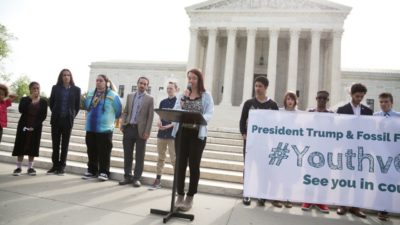Trump Administration Seeks Ninth Circuit Review in Pioneering “Atmospheric Trust” Case
U.S. District Judge Has Denied Government’s Effort to Dismiss Cutting-Edge Public Trust/Climate Change Case

Back in August 2015, I blogged on a then newly-filed federal lawsuit in which a coalition of children and their legal guardians sued the federal government to challenge the government’s proposed approval of a controversial liquefied natural gas (LNG) terminal proposed to be located on the Oregon coast. That lawsuit contends that approval of the project would incrementally increase the nation’s greenhouse gas (GHG) emissions and–more dramatically–that the children have a due process- and public trust-based right to be free of those emissions and a warming client.
As I reported then, the Juliana et al. v. United States case actually represents the second generation of so-called “atmospheric trust” litigation. Previously, advocacy groups had filed a flurry of lawsuits against the federal government and each of the 50 states, arguing that the common law public trust doctrine and due process principles proscribe state and federal governments’ actions and non-actions leading to increased GHG emissions. That earlier litigation did not fare well, with virtually all of the 51 lawsuits being quickly dismissed on various legal grounds.
I mused in my earlier post that the Juliana litigation was likely to have relatively greater success, for two key reasons: first, the children had retained the top-notch California law firm of Cotchett, Petrie & McCarthy to pursue the litigation; and, second, because renown former NASA climate scientist James Hansen was providing his support to the plaintiffs’ efforts as well–both as a named legal guardian of the plaintiff children and as an acknowledged expert in the field of climate science.

Subsequent events have proven that prediction to be correct.
This past November, U.S. District Judge Ann Aiken denied the government’s (and intervener fossil fuel industry’s) motion to dismiss the case, finding that plaintiffs have legal standing to bring the action, and that they’d stated a legal claim warranting a trial on the merits of their claim. Judge Aiken’s lengthy ruling makes for most interesting reading: among other things, she opined, “Exercising my `reasoned judgment,” I have no doubt that the right to a climate system capable of sustaining human life is fundamental to a free and ordered society.”

The Trump Administration, dissatisfied with this interim ruling, asked Judge Aiken to certify her order for immediate appellate review. (Normally, civil litigants must await a “final judgment” in the district court before they can appeal from such a ruling.) Predictably, the district court denied that request on June 8th.
Undeterred, the very next day the Trump Administration filed a petition with the U.S. Court of Appeals for the Ninth Circuit, asking that court to immediately review the district court’s denial of its motion to dismiss the Juliana lawsuit. That petition also requests the Ninth Circuit halt the district court proceedings while it considers the Administration’s request for an immediate appeal.
It seems unlikely that the Court of Appeals will be any more receptive to the Administration’s request for immediate appellate review of Judge Aiken’s November 2016 than was she. It’s far more likely that the Ninth Circuit will allow this groundbreaking litigation to play out in the district court before it takes up the formidable issues the case presents on appeal.
This doesn’t mean that the plaintiffs in the Juliana case are assured of smooth sailing ahead. To the contrary, their case faces considerable obstacles, especially concerning the issue of causation–i.e., whether the harms alleged in their lawsuit can be fairly traced back to the actions of the government. But District Judge Aiken has quite clearly signaled that she takes the case seriously, and that she’s prepared to allow the litigation to proceed to trial. And a momentous trial it promises to be.
One postscript: with the Trump Administration expressly and repeatedly declaring it plans to reverse the Executive Branch’s prior commitment to GHG reduction efforts in the U.S., the question arises whether the judicial branch of the federal government has–or should have–a larger role to play in addressing the myriad legal and policy issues of climate change. The U.S. Supreme Court addressed this issue–at least preliminarily–in its 2011 decision American Electric Power Co. v. Connecticut. It will be interesting to see if the Supreme Court–or lower federal and state courts–revisit that overarching question in light of the Trump Administration’s most unfortunate decision to abandon the field of climate change law and policy.
Reader Comments
One Reply to “Trump Administration Seeks Ninth Circuit Review in Pioneering “Atmospheric Trust” Case”
Comments are closed.







This case may by stronger by focusing on localized action and effects (i.e., the LNG terminal on the Oregon Coast and its impact on the surrounding population of children).
Infant mortality rates are highest in coal producing states, and the greatest concentrations of incidents occur around coal-fired power plants. Infants and children are the most vulnerable to greenhouse gas emissions, so they are an appropriate class or group to seek legal protection. To the extent that similar findings or causation can be established with LNG, this case will have a greater chance of success.